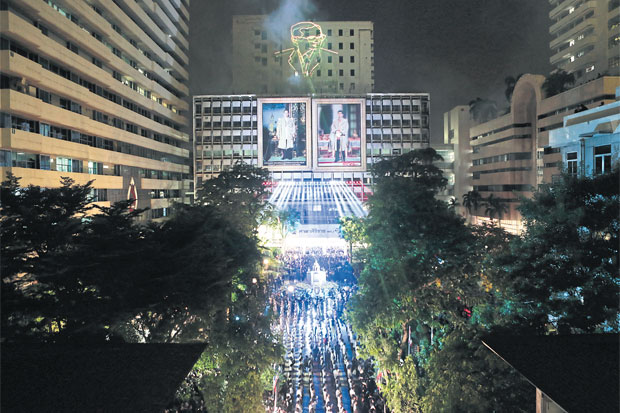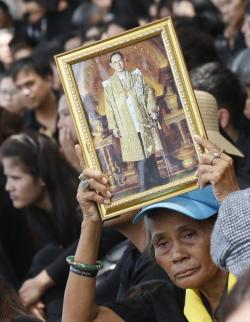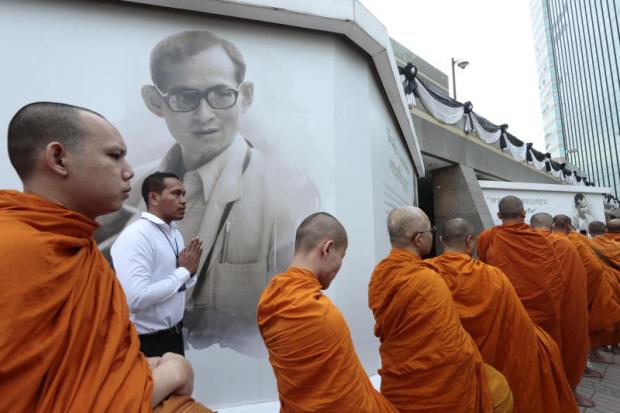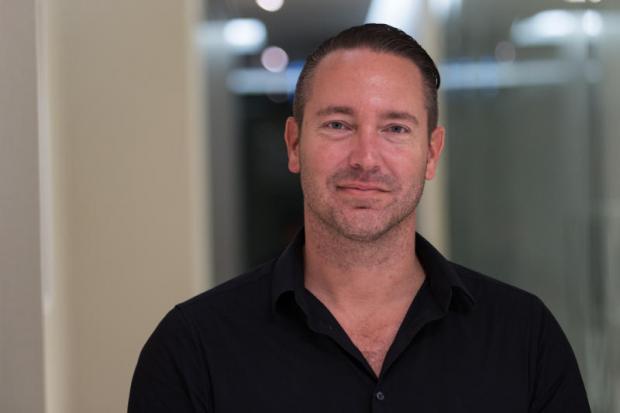
Born in 1939, Dr Sanjai Sangvichien has proudly lived during three reigns of the Chakri dynasty, and he can still vividly remember the day when, as a little boy, he got his first sight of a king.
When Dr Sanjai learned, in 1946, that King Rama VIII, Ananda Mahidol, would visit Bangkok's Siriraj Hospital, he was overjoyed. Since he lived in the area, he could easily travel to the hospital and be one of the first to arrive, thus securing a prime spot.
King Ananda Mahidol had not long returned to Thailand after completing his studies in Switzerland and was visiting Siriraj Hospital to pay his respects to the statue of his father, Prince Mahidol Adulyadej, the Prince of Songkla. At Rama VIII's side was his brother, and future successor, Bhumibol Adulyadej, who was a prince at that time.
The sight of the present and future kings enchanted the seven-year-old Dr Sanjai, and he has followed the Thai monarchs ever since. Each time King Rama VIII visited Siriraj, young Dr Sanjai would be there in the front row to greet him -- but little did he know he would have only a few short months to enjoy this routine. On June 9, 1946, King Ananda Mahidol passed away. Dr Sanjai remembers how devastated he was to lose his king.
"The whole nation was shut down," Dr Sanjai recalls. "I remember it so well. As a young kid, I felt like it was the biggest loss of my life. I felt empty and almost like I had no hope left."
Dr Sanjai made sure he would continue to take his place in the front row, this time for King Rama VIII's royal procession. He rushed to Sanam Luang with a grass mat so that he could sleep on the street the night before and be in the best position to bid a final farewell to his beloved monarch.
Seventy one years later, Dr Sanjai says he can still feel the pain that was shared by the entire nation. It was a heartbreak that would be renewed on Oct 13, 2016, when King Bhumibol Adulyadej, who had succeeded his brother, passed away. After a remarkable 70-year reign, the loss of King Rama IX was Thailand's darkest chapter.
A SORROWFUL DUTY
The sorrow Dr Sanjai felt at losing King Rama VIII was softened when the late King Bhumibol Adulyadej became the new monarch, as he felt sure the nation would be in good hands under King Rama IX.

"It was such a great feeling to know we at least had another king to take care of his citizens. Even though he went back to Switzerland to complete his studies before he returned to Thailand permanently, I still felt like we had a hope to be led by a great king again," Dr Sanjai explained.
He followed the new king with the same devotion, attending as many important ceremonies as he could, and watching on television those that he couldn't. When King Bhumibol Adulyadej travelled abroad, Dr Sanjai would feel like there was something missing, but as soon as he saw the royal news for an update on the king's movements, this feeling would go away.
Dr Sanjai later studied at Chulalongkorn University's medical school. While in higher education, he did not have as much time to follow the king as when he was a young boy, but Rama IX made a habit of visiting universities in Bangkok, where he would play music with the students as a way to get to know his subjects. Dr Sanjai never missed a performance when the late king performed at his university.
After he graduated and grew up, Dr Sanjai began his career with the dream of one day personally tending to the king. This did not happen during Bhumibol Adulyadej's life, but Dr Sanjai would yet be honoured to serve his king.
As part of the department of anatomy in Mahidol University's faculty of science, he was kept updated on the late king's worsening health last year with many announcements from the palace.
He joined thousands of fellow Thais as they gathered at Siriraj Hospital, where King Rama IX was being treated, to pray for his recovery. But on the afternoon of Oct 13, Dr Sanjai was told to prepare his team for the worst news.
"Professionally, I got my team ready to prepare the formaldehyde in order to eject it into the late king's body," he said. "But personally, I was all shaky. I didn't even think I would live long enough to get through this day. I knew I had to get everything ready but I was in denial. I only hoped that he would somehow wake up and my orders would be cancelled. Unfortunately, there was no miracle."
King Bhumibol Adulyadej was pronounced dead at 3.52pm on Oct 13, 2016. Before this news was made public, and while his fellow Thais continued to pray, Dr Sanjai led his team to preserve the late king's body. He bowed down on the floor and paid respect to the late king before letting his team perform the medical procedure.
"It felt so unreal. I was so numb and I couldn't even think straight," Dr Sanjai said. "I remember how empty and lonely I was when the king went away abroad, and that feeling came back to haunt me again after he passed away."
LOYAL TO THE KING
A descendant of Indian immigrants, Sakda Sachamitr was raised to be thankful for the Thai monarchy. His family moved here during the reign of Rama V, King Chulalongkorn, who allowed them and other foreigners to stay and make a living in the land of Siam.
Mr Sakda was taught to be loyal to the king since his family's existence and prosperity were all thanks to the opportunity granted to them by King Rama V. Therefore, he always works to help others as a way of following in King Chulalongkorn's footsteps.
"He always lived his life for other people," Mr Sakda explained. "The happiness of his people always came first and that inspired me to do the same thing. I launched many charities and do a lot of social work to help others."
During the late King Bhumibol Adulyadej's final years, Mr Sakda would visit Siriraj Hospital to pray for him along with hundreds of other people. Although he is a Sikh, he nevertheless joined in with the Buddhist prayers for the king's recovery.
"I spent the past 10 years coming to pray for the late king. I prayed that he would live until he became 120 years old, and more. I was even willing to trade my life for his," Mr Sakda explained.
The image of an ethnic-Indian Thai man crying as he held a picture of the late King Bhumibol Adulyadej on the night of Oct 13 last year spread in the media. The Ministry of Culture later tried to identify and find the man, who turned out to be Mr Sakda.
On the night of the memorial service held at Siriraj Hospital on Oct 13 this year, Mr Sakda attended with his family. He brought 12,000 black rubber wristbands to give to everyone for free. He walked around the hospital all day to hand out the wristbands he had prepared.
"I want everyone to wear this wristband and remember all the good things that the late King Bhumibol Adulyadej did for us through his entire life. Then use their two hands to do the same things to give back to the society," Mr Sakda said.
FROM GRIEF TO GIVING
Rattikan Kammuang was in a meeting at her office on the afternoon of Oct 13, 2016. She started to receive a lot of social media updates about the late king's health. Even though her shift didn't end until 5pm, as soon as she came out of the meeting, she asked her boss if she could leave early so that she could go to Siriraj Hospital to pray.
It was a hazy and gloomy day. Ms Rattikan arrived at the hospital with a bad feeling inside. The atmosphere was chaotic as news started spreading that Thais' worst fears had come true, but they attempted to dismiss it as mere rumours and continued to pray.
But at 7pm, the Palace released official confirmation that King Rama IX had passed away.
"All I heard was people crying," Ms Rattikan explained. "I was trying to stay positive but at that moment it felt like it's all over. I couldn't even imagine my life without him. We sang the royal anthem together and continued to cry. I was there until 9pm before I went home. I cried myself to sleep on that night."
The following day, Ms Rattikan went to the Grand Palace, where the late king had been taken. Even though she couldn't get close enough to see the procession, she took comfort from the knowledge she was on the same ground as him.
Ms Rattikan has travelled to the Grand Palace every night since then, and even though the ceremonies have been closed to the public, she has offered her prayers from outside the walls.
"I went there for a week and cried every day. Then I realised I shouldn't be doing this. That's when I started to think I should help others the way King Bhumibol Adulyadej would do. So I bought hundreds of packs of water, loaded them in my truck, and handed them to people who came to the area," Ms Rattikan explained.
She started to volunteer in every activity held for the late king. She also travelled around the country raising funds to help underprivileged Thai people. She can now finally feel what it is like to give back to society the way the late king did.
"I turned my sorrow into positive energy and started to do good things for others. It is sad that the late king is no longer here but his works inspired me to do good things for society in a way I had never thought of before," Ms Rattikan said.
RISING OUT OF CONFLICT
The first time Kaven Srisombat, the president of the Network of Mien (Yao) ethnic group, met King Bhumibol was in 1973. The Yao people had moved to a new home set up by the late king following years of fierce fighting between the Thai military and communists at the rim of northern Thailand, where ethnic villages had been turned into battlegrounds.
The communist insurgency began to spread across the northern border in 1964 in the middle of the Cold War.
Thai military governments at the time aligned their foreign policies with American anti-communist foreign policy so as to receive financial and military aid.
Communism was declared a threat. With support from US forces, roads were cut into ethnic villages in deep forest land.
Mr Kaven's village in what is now Chiang Kham district of Phayao province was declared a red zone where the communist insurgency was seeping into Thai territory via Laos.
The insurgency embedded in ethnic villages, assisting them in daily activities and even providing medicines. They promoted rights and class revolution, but also sought to undermine the monarchy. On the other hand, the hostility of the Thai military, acting under a policy of extreme communist suppression, pushed many ethnic people to fight for the reds. Some minorities recalled Thai air force planes circling over their villages, sometimes dropping bombs.
In 1972, a young Mr Kaven graduated from Chiang Mai Teacher College. He couldn't return home because the conflict still raged there.
So he decided to teach at a rural school in a village named Ban Mai Rom Yen (new home of peace) in Phayao, which at the time was under the administration of Chiang Rai province.
This village was set up by King Bhumibol to give a new home to ethnic people who had been displaced by the conflict.
"Without a new home, ethnic people would have shut themselves off in their villages. They would have been forced into a crossroads where they must choose either to side with the communists or surrender to the state," Mr Kaven said.
"The late king had a vision. If ethnic people were stuck where they were, they would be suppressed by military force indiscriminately."
King Bhumibol visited Ban Mai Rom Yen in 1973. Mr Kaven joined in with others to report on the village's development progress. He recalled Her Majesty Queen Sirikit, by the side of the king, asked what aid the villagers needed. Mr Kaven asked for education funding.
The next year, King Bhumibol returned. Mr Kaven led community members in making fabric embroidered with the colours of the Thai flag to welcome the king, reflecting their loyalty to the country and monarchy, and to show they were not communists.
"He smiled," Mr Kaven remembered well. "To have a king who cared about our village, we felt safe. He won our hearts."
The late king showed concern for the livelihoods of ethnic minority groups as they needed to adapt to flat land after generations spent living in the hills. He set up a healthcare centre, initiated royal projects and sent livestock to the village so that they could survive and boost their income.
Mr Kaven welcomed King Bhumibol again in 1976 when he reported that he would leave the village to pursue higher education in Chiang Mai.
Having King Bhumibol as a role model, Mr Kaven qualified as a teacher and worked his whole life to improve education for ethnic children.
When he heard about the king's death, he felt shocked.
"The king taught us by doing. He never ceased working. He inspired me to do the right things," Mr Kaven said.
DIFFERENT NATIONALITIES, SAME RESPECT
Spectrum spoke with a handful of long-term expats in Thailand about the death of King Bhumibol Adulyadej. Each has a different perspective of this significant moment in Thai history, but they all share one thing: their respect for the late king and Thai people during this time.
Jeff Pham is from Vietnam and has been living in Thailand for almost five years. He works with Thais and foreigners at the national headquarters of a large company. He remembers many of his Thai co-workers breaking into tears when they heard the sad news last year.
"I tried to comfort them. I felt sad also," he said. "It was a very sad day at the office."
In the weeks and months that followed, Mr Pham noticed a change in the atmosphere in his circle of friends and in the larger community.
"People became a little bit more quiet. [I noticed this] among my friends also. The first few months they didn't want to go out, maybe because they were in a very bad mood because of that news," he said.
Matthew Thomas, an Australian who's lived in Thailand for the past five years, also felt a change.
"I think it's brought the community together," he said. "People [connect] through this one experience; showing respect by wearing the appropriate coloured clothes or not having over-the-top parties or celebrations," he said.
Mr Thomas says the mourning period following the king's passing caused him to learn a lot more about the late monarch's many contributions to Thai society.
"I knew about some of it before he passed away, but learned a lot more afterwards," he said.
Mr Thomas spoke specifically about the late King Bhumibol Adulyadej's efforts to eradicate the drugs trade in the Golden Triangle through agricultural practices, such as growing profitable legal crops to steer farmers away from cultivating narcotics.
For Christopher Bucheler, a New Zealander living in Thailand, the year of mourning has further solidified his understanding that Thai people truly loved the late king.
"I've seen the adulation people have had for him," he says.
Kate Bailey is another New Zealander. She has lived in Thailand for six years. She says this period of mourning has reminded her of her host country's unique culture.
"It has this incredible historical legacy and ceremonial culture that I think most expats would only ever scrape the surface of unless they are deeply involved with Thai people," she said.
"It is a unique nation with its own emotional priorities and resonance that is not like any other place."
As for foreigners who are new to Thailand, Ms Bailey hopes they will take time to understand the king's legacy and Thai culture.
"I hope that they would actually learn a little bit about the king's life works," she said. "If [foreigners] are just here on holiday or are just passing through professionally, I think it would behove them to try and see the culture as a very multi-faceted thing. The side that you see as a tourist is only really the tip of the iceberg."
MENTAL HEALTH CONCERNS
After a year of mourning, the royal cremation will be held on Thursday. Many people are still sad after King Bhumibol passed away. Some people are trying to get over their loss by remembering the late king for the positive things he did, while others are coping by volunteering and carrying out charitable works.
Dr Boonruang Triruangworawat, director-general of the Department of Mental Health, expressed his concerns for Thai people this past week as the royal cremation ceremony draws closer.
He said volunteers who are helping with different works at the funeral are those he is most concerned about in terms of their mental health.
The volunteers may suffer stress from working amid an atmosphere of grief. This could cause them to feel sad, and experiencing such feelings every day could have a long-term effect.
They might also be affected by working long hours and may not be rewarded the way they might expect. The volunteers could also be stressed out by having to perform duties that do not match their expertise.
"[Symptoms of stress] can be blurry thoughts, forgetfulness, absent-mindedness, crying for no reason and having recurring nightmares," Dr Boonruang explained.
He offered advice to the volunteers on how to prevent falling into depression. Firstly, they should be aware of the positive side to what they are doing and how much they can contribute. And no matter what they do, they shouldn't let it affect their personal lives, work or families.
The volunteers should perform tasks they are good at and enjoy in order to prevent stress and resentment from doing things they don't like. It is also important for volunteers to offer each other practical and emotional support. To be able to talk about the problems they face and compliment each other on what they do can also help release tensions.
Most importantly, everyone should be aware that the volunteer work is not mandatory. They can do it when it's convenient and it shouldn't affect their daily lives. To take turns performing duties is a rational way to manage the balance between workloads and personal lives.
"The most important thing is to get back to their normal lives, performing their usual duties, in order to maintain good mental health," Dr Boonruang said.

NEVER FORGET: People pray during a remembrance ceremony for the late King Bhumibol Adulyadej. PHOTO: Patipat Janthong

GIVING BACK: Grieving Thais offer morning alms to Buddhist monks during a merit-making religious ceremony to mark the first anniversary of King Bhumibol's death. PHOTO: Patipat Janthong

A SAD DAY: Vietnamese Jeff Pham remembers how King Bhumibol's death affected his Thai colleagues. Caitlin Taylor

COMMUNITY: Australian Matthew Thomas gained a deep appreciation for King Rama IX's work. PHOTOS: Caitlin Taylor
